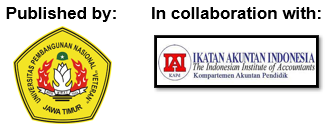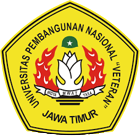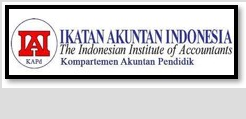Household Financial Planning in Achieving a Balanced Budget
DOI:
https://doi.org/10.33005/jasf.v7i1.476Keywords:
Financial planning, household, balanced budget, housewife, family financeAbstract
Financial planning is like a map that determines the direction of family finances. The unmet needs of a family are often not due to a small income but due to expenses that are often uncontrollable. This research aims to find out the application of household financial planning to achieve the principle of a balanced budget. This research uses a qualitative method with a case study approach. The data collection was done by observation, direct interview, and documentation. The location of this research is the informant's residence within the scope of Sananwetan Subdistrict, Blitar City. The results of this study show that housewives plan their finances every month. The planning done is based on the previous month's records. The decision-making practices carried out by housewives to determine financial allocations are not necessarily decided by themselves, but they involve their husbands and other family members to deliberate to produce the best solution. To achieve budget balance, awareness is needed to prioritize primary needs and pay attention to lifestyle. These results implied that families can pay more attention to health insurance and investment aspects so that expenses become equivalent to income or a balanced budget. Therefore, this research not only enriches literature related to household financial management but also opens up new insights for financial practitioners and family consultants in developing more comprehensive financial literacy programs so that they can sustainably improve household financial welfare.
Downloads
References
Casas, C. M., Cariaga, E., Adlawan, K. M., Batingal, A. V., & Sumicad, E. (2024). Exploring the Bookkeeping Practices of Family-Owned Businesses: A Case Study of Carriaga Traders Mart. Financial and Credit Systems: Prospects for Development, 1(12), 15-23. https://doi.org/10.26565/2786-4995-2024-1-02
Caglio, A. & Cameran, M. (2020) Educating the next generation of accountants: How to promote ethical consciousness through critical thinking, Accounting Ethics Education: Teaching Virtues and Values. https://doi.org/10.4324/9780429321597
Creswell, J. W. (2013). Research Design: Qualitative, Quantitative, and Mixed Methods Approaches. USA: Sage Publication.
Fitriyah, N., Sukma, A. A., Bambang, B., Maulina, N., & Astiti, N. (2021). Edukasi Pentingnya Praktik Akuntansi (Pencatatan Sederhana) dan Manajemen Keuangan dalam Rumah Tangga pada Karyawan RSIA Permata Hati Mataram. Jurnal Abdimas Sangkabira, 1(1), 14–26. https://doi.org/10.29303/abdimassangkabira.v1i1.23
Francke, A. E. & Carrete, L. (2023), Consumer self-regulation: Looking back to look forward. A systematic literature review, Journal of Business Research, Volume 157, 113461. https://doi.org/10.1016/j.jbusres.2022.113461
Ghozie, P. H. (2013). Make it Happen! Buku Pintar Rencana Keuangan untuk Wujudkan Mimpi. Gramedia Pustaka.
Hasmi, N. (2019). Fenomenologis Penerapan Akuntansi dalam Rumah Tangga pada Guru-Guru SMK Publik Makassar. Tangible Journal, 4(2), 278–294. https://doi.org/10.47221/tangible.v4i2.93.
Hosany, A. R. S. & Hamilton, R. W. (2022), Family responses to resource scarcity. Journal of the Academy of Marketing Science, 51, 1351-1381. https://link.springer.com/article/10.1007/s11747-022-00882-7
Huda, N. (2017). Keuangan Publik Islami: Pendekatan Teoritis dan Sejarah. Prenada Media.
Idrus, M. (2021). Fenomenologi Akuntansi Rumah Tangga (Studi Kasus Pada Keluarga Di Desa Kading Kecamatan Awangpone Kabupaten Bone). Accounting, Accountability, and Organization System (AAOS) Journal, 2(2), 112–125. https://doi.org/10.47354/aaos.v2i2.268.
Indriyani, W. (2019). Cerdas dan Bijak Mengatur Keuangan Rumah Tangga. CV. Embrio Publisher.
Intan, I., Suryana, Nuridah, S., & Kusumaningtyas, D. S. (2023). Penerapan Akuntansi Keluarga dan Pengelolaan Keuangan dalam Rumah Tangga Pasangan Milenial. Innovative: Journal of Social Science Research, 3(5), 9480–9492. http://j-innovative.org/index.php/Innovative/article/view/6026.
Kang J., Martinez, C. M. J., & Johnson, C. (2021), Minimalism as a sustainable lifestyle: Its behavioral representations and contributions to emotional well-being. Sustainable Production and Consumption, Volume 27, 802-813. https://doi.org/10.1016/j.spc.2021.02.001
Kirana, A. A. M., Muchlis, M., & Fajrin, F. (2022). Sebuah Studi Fenomenologi: Akuntansi Rumah Tangga dalam Pengelolaan Keuangan Keluarga Sakinah. ISAFIR: Islamic Accounting and Finance Review, 3(1), 164. https://journal.uin-alauddin.ac.id/index.php/isafir/article/view/47971.
Kusdiana, Y., & Safrizal, S. (2022). Faktor-Faktor yang Mempengaruhi Perencanaan Keuangan Keluarga. JAS (Jurnal Akuntansi Syariah), 6(1), 127–139. https://doi.org/10.46367/jas.v6i1.580.
Mauliyah, N & Masrunik, E. (2015). Dasar Akuntansi Suatu Pengantar, Penerbit NEM.
Mazlan, A. M., (2024) Savings Vs Splurges: Mindful Consumption for Financial Well-being (May 28). Available at SSRN: https://ssrn.com/abstract=4844943 or http://dx.doi.org/10.2139/ssrn.4844943
Nobes, C. (2015). Accounting for capital: the evolution of an idea, Accounting and Business Research, 45(4), 413-441. https://doi.org/10.1080/00014788.2015.1033130
Prasetyo, W. (2020). Covid-19 Learning Concerning Financial Planning Importance And Household Accounting. Jurnal Reviu Akuntansi dan Keuangan, 10(3), 444–457. https://doi.org/10.22219/jrak.v10i3.13554.
Probowati, D. E. P. (2021). Akuntansi dalam Pencapaian Tujuan Rumah Tangga Islami. Ecopreneur: Jurnal Program Studi Ekonomi Syariah, 2(1), 62. https://doi.org/10.47453/ecopreneur.v2i1.328.
Putra, H. A., Halpiah, H., & Rosita, R. (2023). Transparansi arus kas rumah tangga keluarga menggunakan aplikasi expense track. Jurnal Inovasi Hasil Pengabdian Masyarakat (JIPEMAS), 6(1), 125–138. https://doi.org/10.33474/jipemas.v6i1.19079.
Rachmawati, D. N. (2021) Pengaruh Literasi Keuangan, Financial Self-Efficacy, dan Sikap Keuangan terhadap Perencaan Keuangan Keluarga. Undergraduate thesis, Universiyas hayam Wuruk (STIE Perbanas Surabaya). http://eprints.perbanas.ac.id/7992/
Renes, S. (2020), When Debit=Credit, The Balance Constraint in Bookkeeping: Its Causes and Consequences for Accounting (June 11). Available at SSRN: https://ssrn.com/abstract=3624726 or http://dx.doi.org/10.2139/ssrn.3624726
Rozzaki, A. D., & Yuliati, Y. (2022). Urgensi Penerapan Akuntansi Rumah Tangga Masa Pandemi Covid-19. JAS (Jurnal Akuntansi Syariah), 6(1), 69–82. https://doi.org/10.46367/jas.v6i1.601.
Santi, F., & Anggraeni, A. Y. (2021). Karakteristik pengelolaan keuangan rumah tangga baru di era pandemi. Keberlanjutan: Jurnal Manajemen dan Jurnal Akuntansi, 6(2), 141–154. http://openjournal.unpam.ac.id/index.php/keberlanjutan/index.
Saputri, F. A., & Iramani, I. (2019). Pengaruh literasi keuangan, nilai pribadi dan sikap terhadap perencanaan keuangan keluarga di Surabaya. Journal of Business &Amp; Banking, 9(1), 123–141. https://doi.org/10.14414/jbb.v9i1.1523
Senduk, S. (2007). Perencanaan Keuangan Keluarga Mencari Penghasilan Tambahan. Gramedia Pustaka.
Siswanti, T. (2022). Pengaruh Literasi Keuangan dan Pola Konsumsi terhadap Pengelolaan Keuangan Keluarga Masa Pandemi COVID-19 Warga Perumahan Bekasi Permai, Bekasi, Jawa Barat. Jurnal Bisnis dan Akuntansi Unsurya, 7(1), 44–61. https://doi.org/10.35968/jbau.v7i1.972.
Suarni, A., & Sawal, A. R. (2020). Peran Akuntansi dalam Rumah Tangga dan Penerapan Pengelolaan Keuangan Rumah Tangga Secara Islami di Masa Pandemi COVID-19. Assets, 10(2), 110–129. https://journal3.uin-alauddin.ac.id/index.php/assets/article/view/18594.
Sukrianto, S., & Lakoro, F. S. (2022). Penerapan Akuntansi Rumah Tangga Sebelum Dan Setelah Masa Pandemi COVID-19 di Kecamatan Tilamuta Kabupaten Boalemo. Jurnal Ilmiah Manajemen, Ekonomi, & Akuntansi (MEA), 6(3), 570–593. https://doi.org/10.31955/mea.v6i3.2402.
Suryaningrum, D. H. (2019). Power and Knowledge of Double Entry Bookkeeping System in the Feminism Framework: A Proposal. Sustainable Business Accounting and Management Review, 1(1), 19-30. https://doi.org/10.61656/sbamr.v1i1.25.
Suwardjono. (2015). Teori akuntansi perekayasaan laporan keuangan, Edisi 3. BPFE.
Tenriwaru. (2019). Kesejahteraan Tanpa Sekat (Sebuah Praktik terhadap Akuntansi CSR). CV. Tohar Media.
Triseptya, G. N. (2021). Akuntansi Rumah Tangga di Masa PSBB COVID-19. Jurnal Pabean: Perpajakan, Bisnis, Ekonomi, Manajemen, 3(2), 153–158. https://jurnal.politeknikbosowa.ac.id/index.php/pabean/article/view/162.
Wahyuningsih, S., Maghfiroh, A., Firdaus, Z., & Bivan, F. (2023). Pentingnya pengelolaan dan manajemen keuangan dalam keluarga. https://www.researchgate.net/publication/375922225_Pentingnya_pengelolaan_dan_manajemen_keuangan_dalam_keluarga.
Wibowo, V. A. S., Wardani, R. P., & Wijanarko, T. A. (2023). Akuntansi Rumah Tangga pada Dosen Vokasi Akuntansi. J-Aksi: Jurnal Akuntansi dan Sistem Informasi, 4(2), 130–142. https://doi.org/10.31949/jaksi.v4i2.5131.
Wulandari, S. (2023) Analisis Pengelolaan Keuangan dalam Rumah Tangga Perspektif Islam pada Ibu Rumah Tangga di Kelurahan Hadimulyo Barat Kota Metro. Undergraduate thesis, IAIN Metro. https://repository.metrouniv.ac.id/id/eprint/7779/
Yani, A., & Purwanti, L. (2024). Optimizing Family Financial Stability Through Islamic Household Accounting Practices: A Literature Review. East Asian Journal of Multidisciplinary Research, 3(5), 1721–1732. https://doi.org/10.55927/eajmr.v3i5.8818
Yushita, A. N. (2017). Pentingnya Literasi Keuangan bagi Pengelolaan Keuangan Pribadi. Nominal, Barometer Riset Akuntansi dan Manajemen, 6(1). https://doi.org/10.21831/nominal.v6i1.14330.














